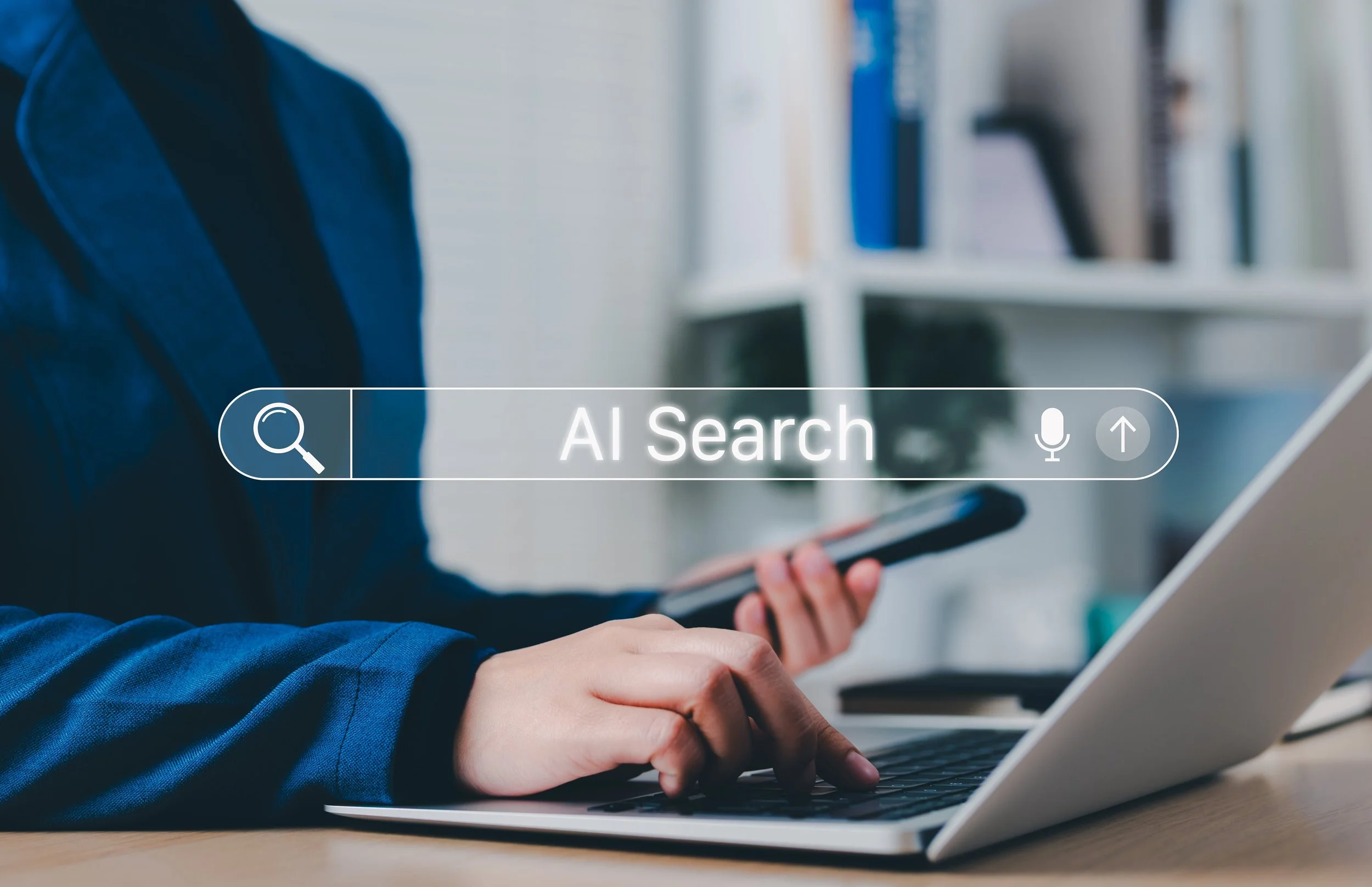How to Optimize for AI Search: A Practical Guide for Content Creators and Small Businesses
Have you noticed a sizable drop in your website traffic? If you go back to your website’s analytics, you’ll probably notice the drop-off started in the spring of 2024. Coincidentally, the same time when AI first emerged on our screens (for many of us non-techies anyway).
Since then, there’s been no turning back. Try as we might, we can’t escape or ignore it — AI has caused a major disruption in the content marketing industry.
“93% of marketers use AI to generate content faster, 81% use it to uncover insights, and 90% use it for quicker decision-making.”
If you think back to what you, as a content creator, were focused on in the spring of 2024, you’ll quickly realize how much life has changed in a relatively short amount of time. At that time, we were focused on using those keywords and trying to stay on top of Google’s updates. Now, people are wondering whether SEO is even relevant anymore.
For content creators, this means the rules have changed. It’s time to move on from the old way of doing things and adapt to life with AI searches. In this post, we’ll go over some core strategies to optimize for AI search, as well as the type of content that performs well in AI searches. And finally, we’ll go over how you can create content that stands out from the abundance of AI-generated sameness on the internet.
What is AI search?
An AI search refers to using apps, such as ChatGPT or Perplexity, for searches. Most people use AI search when they’re looking for specific results that can be adjusted by making small refinements to their original question. Rather than suggesting a list of websites to visit to find your answer, AI searches provide the answers.
You may have also noticed that when you do a Google search, the first thing you see is an AI-generated response. If you were to continue scrolling down, you would eventually see a listing of websites you could visit for more information, but for most people, their questions are answered by the AI blurb at the top of the page.
For consumers, this is wonderful! It’s easier than ever to find the answers they need. But for businesses that have spent years creating SEO-optimized content to achieve the coveted top 10 search engine ranking, it’s not so good. Consumers no longer click on websites to find solutions because AI has already supplied the answer.
How is AI search different from traditional searches?
Traditional search engines primarily rely on keyword matching and basic natural language processing (NLP). Based on several ranking factors (e.g., experience, expertise, authority, and trustworthiness), Google would provide a list of websites that it feels would answer your question.
AI Searches, on the other hand, use advanced NLP, which can factor in the user’s intent and the context of the question to provide a more accurate answer. It no longer relies as much on keywords.
AI search results are presented to the user as direct answers and summaries with links to any sources that were referenced. The results can also be refined with follow-up requests or revisions to the original question. AI learns from the feedback you provide and continues to personalize your results. It can also handle inputs from diverse sources, such as text, voice, and images. Whereas traditional search handles primarily text and offers some support for basic voice inputs.
AI’s more advanced features save users’ time by providing quick, specific answers to their questions.
The one caveat regarding AI searches is that the information AI provides is only as reliable as the underlying data and sources it draws from. It is critical to fact-check the results (a good copy editor can help you with this).
“43% of businesses are put off by the inaccuracies or biases of AI content. ”
Changes in search behavior
1 - Using traditional search engines, consumers would typically focus on adding a few keywords, but not necessarily putting them in the format of a question. With AI searches, people ask very specific questions. For example, instead of searching for "best women’s casual shoe," they may search for "what are the most comfortable women’s shoes for work in size 8 black." AI search handles specific requests written in a conversational style.
For content creators, it’s important to create pieces that incorporate question-based headers or include FAQs. In addition, your content should mirror the conversational tone of the questions.
2 - People prefer direct answers that condense the relevant information into one easy-to-read synopsis. Users no longer want to wade through multiple links to find their answer.
AI draws from content that is clear, concise, and well-formatted. To ensure your content is optimized for AI, organize your information (e.g., with bullets or tables), avoid long, rambling, highly technical paragraphs, and consider adding a summary or list of key takeaways at the beginning or end of your content.
3 – AI focuses on more than just keywords—AI considers source quality and credibility. Remember Google’s algorithm, E-E-A-T? Experience, expertise, authority, and trustworthiness are still important considerations for AI. AI is more likely to pull from sites with clear author bios, citations, and up-to-date content. In addition, AI models frequently prioritize high-authority sites. If your site isn’t well known yet, quality links, transparency, and consistency will help to establish authority.
Specific strategies to optimize your site for AI search
1 – Create clear, useful, and authoritative content
This may sound familiar to anyone who has been doing SEO work within the past few years. For many years, search engines have valued content that is designed to educate and solve your client’s problems. It turns out that AI also values clear, high-quality content, so continue to create content that solves problems for your clients (and remember to cite your sources).
2 – Use structured, scannable formatting
Ensure that your content follows a logical flow and is formatted with H2 and H3 headers. Dividing your content into sections with headers allows AI to easily locate your main points. AI also prefers numbered lists, bullet points, and tables. Finally, the addition of summaries or key takeaways will help guide AI to your content.
3 – Answer questions directly
Think back to the types of questions your potential clients might be asking—what problems are they looking to solve? Make sure those questions are answered in your content.
4 – Keep metadata and on-page SEO strong
This step has not changed for content creators. You still need to write titles and meta descriptions with your keywords, just as you always have. Also, remember to include descriptive alt text for images.
5 – Focus on trust and citations
Linking to high-quality, reputable sources continues to be an essential step for content creators. Remember also to clearly display author credentials. And, just like SEO best practices, build backlinks when possible.
What type of content performs well in AI searches?
AI prefers information that is straightforward and easy to find. Think of content that follows a simple format:
Step-by-step tutorials and how-to guides
FAQs or Q&As by experts
Side-by side-comparisons
Summaries, checklists, and templates
Why humans are still needed in the content creation process
Personal voice connects and engages
While AI can quickly generate large amounts of content, it can’t replicate the unique voice and style of human writers. Readers enjoy hearing about a writer’s experiences and perspective on different issues. This helps to create trust and connection with readers— something that AI can’t match.
The importance of subject matter experts
Subject matter experts gain valuable knowledge and insight from firsthand experiences. Humans can achieve a deeper, more practical understanding of a subject that AI cannot replicate. When a subject matter expert shares his or her real-life experiences and the insights gained from them, readers appreciate it. This builds a level of trust with readers that AI-generated content could never achieve.
Originality cuts through the noise
AI-generated content has flooded the internet, leaving us stranded in a sea of generic, mediocre writing. To cut through the copious amount of bland content on the internet, publish articles with your original ideas and perspectives. If you can look at a familiar issue and offer fresh insights, you will stand out. So, go ahead and show your own data, interpretations, and lessons learned—it will help you stand out.
How a content editor can bring a human touch
Content editors can help make your posts AI search friendly. But make sure you are using an AI content editor (or at least one who is very familiar with AI search optimization). Editors can ensure your content connects with readers, is grammatically and factually correct, meets your marketing objectives, and follows the best practices outlined above.
The good news for small businesses is that there is a lot of overlap between SEO best practices and AI search optimization. Both prefer expertise, trustworthiness, authority, and clear, well-organized writing. Both require solid on-page optimization with meta descriptions, alt-image tags, and headers.
However, AI search puts significantly less emphasis on keywords. In addition, AI prefers to draw from content that answers specific questions. Content creators should keep this in mind when they create their posts and articles. By creating clear, concise content that answers specific questions and includes links to trustworthy sites, businesses can increase their chances of having AI link to their site.
The following are the key takeaways from this post:
Use the following 5 steps to optimize for AI:
1. Focus on providing direct answers
Structure your content with clear, question-based headings, step-by-step instructions, and concise answers. Use FAQs, summaries, and checklists for maximum visibility.
2. Build authority and trust
Demonstrate expertise with in-depth, topic-centric content. Show author credentials, cite reputable sources, and build credible backlinks to boost E-E-A-T signals.
3. Optimize formatting for AI
Use headers (H2, H3), bullet points, tables, and schema markup (especially FAQs and How to guides) for your pages. Well-structured data acts as a cheat sheet for both traditional and AI search engines.
4. Keep technical SEO and metadata strong
Write compelling meta titles/descriptions with relevant keywords. Use descriptive alt text for all images and ensure your site is fast and mobile-friendly.
5. Focus on trust and citations
Link to high-quality, reputable sources, remember to clearly display author credentials, and build backlinks.
Do you need help optimizing your website content for AI search? Reach out to me for a free consultation over Zoom and we’ll work on a plan to optimize your website for AI search.


